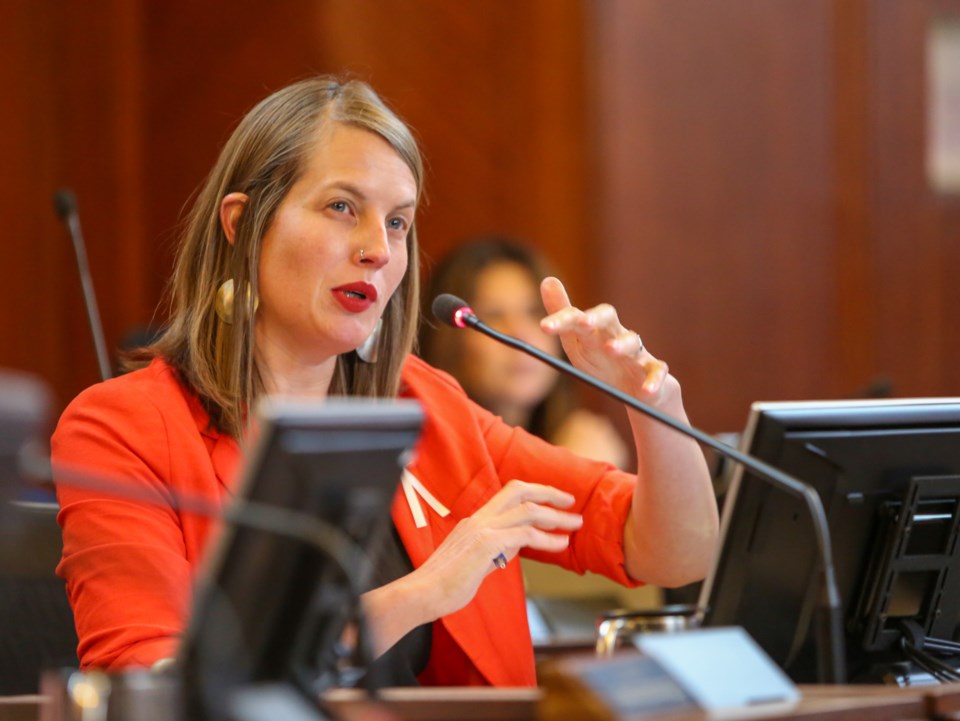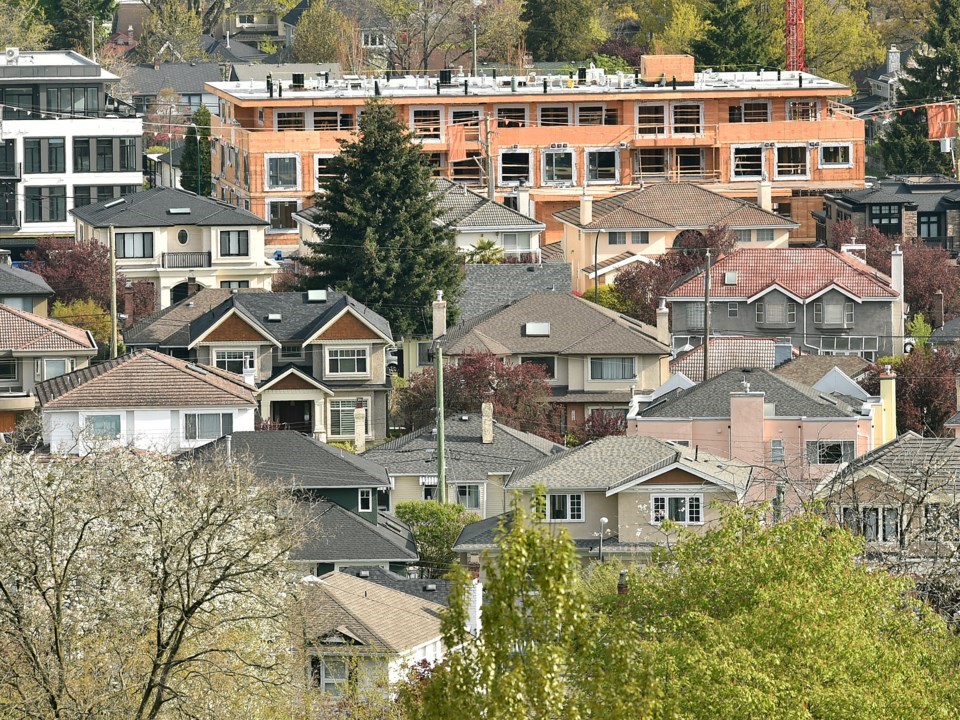More than 20 rental housing advocates lined up at city hall Wednesday (Dec. 7) to call for council to support councillor Christine Boyle’s push to add non-profit, co-op and social housing — some up to 12 storeys —in every neighbourhood in Vancouver.
Council heard from citizens representing business, non-profits, co-ops and faith communities, along with long-time renters, a university student and a leader of a women’s organization who urged the ABC Vancouver majority to support Boyle’s motion.
“This motion, if passed, would help introduce a more humane and respectful process in the development of much needed social housing across all neighbourhoods in Vancouver,” said Marika Albert, policy director of the BC Non Profit Housing Association.
Boyle’s motion calls for rental housing up to 12 storeys in zoning districts already approved for six-storey buildings and to allow additional height and density in other areas for co-op, non-profit and non-market housing.
The most controversial aspect of the motion is for council to delegate authority to city staff to approve developments without the need for rezoning and public hearing.
“There's no one silver bullet, but this may be as close as we'll get,” Boyle said in introducing her motion.
“Delegating final approval to staff for housing we know we need reduces risk, it reduces costs and increases the chances of receiving senior government funding and brings more homes online more quickly.”
She pointed out that staff analysis shows half of recent social housing developments have required rezoning via public hearing, compared to less than a third of market condominium development.

'Quite literally a $4 million increase'
In Vancouver, single detached homes do not require a public hearing, even when a new detached home is significantly larger and more expensive than the one it is replacing.
William Azaroff, CEO of the non-profit Brightside Community Homes Foundation, told council that a project his organization was building in Marpole saw a significant increase in costs because of the rezoning process.
“What happened was over the last six months before we got to development permit — with the incredible escalation of interest rates and construction costs — we saw quite literally a $4 million increase to the project cost,” Azaroff said.
“Had we been able to skip rezoning and save eight, 10 or 12 months off of that project, we could have locked in at much lower interest rates, we could have gotten tenders in before cost escalations went up.”
Jane Talbot, interim president and CEO of the Downtown Vancouver Business Improvement Association, said the organization strongly supports policies that create more affordable housing in the city.
Talbot emphasized the need for more housing options for people employed downtown.
“Businesses in downtown Vancouver are finding it progressively difficult to hire and retain employees because of the city's escalating housing costs,” she said.
“High rental rates have made it almost impossible for workers to live near their workplaces. Working downtown is simply too expensive for many of the workers, who could address the staffing shortages and add to the vibrancy of our community.”
Clara Prager of Women Transforming Cities said an extensive public engagement exercise the organization conducted this year with women’s centres, youth groups, seniors’ advocates, urban Indigenous communities and others concluded housing was the most pressing concern.
“Eighty-six per cent of residents said that housing affordability was the reason that they feel that Vancouver is not a city where they belong,” Prager said. “This rose to 100 per cent for both Indigenous respondents and trans respondents.”
'They're not elected officials'
As of noon Wednesday, 23 of 24 citizens who spoke urged council to support Boyle’s motion. Barbara May was the only person to oppose the motion, pointing to the request to delegate city staff to decide on rezonings.
“This is a problem as city staff are completely unaccountable to the public,” May said. “They’re not elected officials and their decisions in the past have frequently been opaque.”
May acknowledged that affordable rent in Vancouver is “a serious issue” but argued much of it can be attributed to the city’s housing stock being commodified, saying many new apartments are being sold to investors.
Boyle, the lone OneCity representative, on a council dominated by Mayor Ken Sim and ABC Vancouver, urged the new council to support her motion. She attempted to move a similar motion in the previous term of council, but it was defeated.
Boyle pointed out “most of us committed to supporting this approach” during the recent election campaign. ABC promised to double the number of co-ops and increase the city’s investment in social and supportive housing over the next four years.
“So my pitch is let's not be as dysfunctional as the last council,” she said. “Let's make it faster and easier to build the housing that we know Vancouverites need.”
A total of 58 citizens registered to speak to council Wednesday. Council was expected to hear from all speakers before the end of the day before voting on the motion.
Update: Boyle's motion passed with input from councillors Pete Fry and Adriane Carr regarding tenant protections and an amendment from ABC Coun. Mike Klassen.
Here is the full motion, as amended:
That Council affirm its commitment to reducing the barriers to providing non-market housing in the city and direct staff to bring forward recommendations and analysis for Council to consider toward enabling the delegation of authority to City staff to approve developments of up to 12 stories (with a corresponding increase in FSR), as already contemplated in the Vancouver Plan, in the RM-3A and the RM-4 and RM-4N zoning districts where 100% of the residential floor area is developed as social housing (coop, non-profit and non-market housing), or social housing in conjunction with a child day care facility;
FURTHER THAT Council shall, upon receiving and considering staff’s recommendations and advice toward reducing the barriers to providing non-market housing in the city, give consideration to referring the matter to a Public Hearing within the context of the Vancouver Plan planning framework.
THAT Council direct staff to report back on considerations, feasibility, and recommendations for allowing additional height and FSR in other zoning districts (including RS, RT, RM, and mixed commercial-residential zones) where 100% of the residential floor area is developed as social housing (coop, non-profit and non-market housing), or social housing in conjunction with a child day care facility, including recommendations for how And that this work could potentially be prioritized within the Vancouver Plan implementation framework.
THAT Council direct staff to report back with analysis and potential changes to the City’s current Tenant Relocation and Protection Policy for Non-Market Housing Development (3.1) – including any unintended impact on new housing viability and affordability – consistent with the Tenant Protection for Market Rental Housing Development (2.1) in order to provide an potential options for financial compensation based on length of tenancy, where pre-existing market tenancies have been purchased by a non-market or social housing provider for the purpose of redevelopment.
THAT Council direct and otherwise empower staff to engage with the community housing sector on potential clarifications and/or changes related to the city’s definition of social housing in order to improve the policy and strengthen public understanding and trust, without inadvertently creating barriers to developing community housing at break-even rents where there is no funding from senior levels of government;
FURTHER THAT staff report back on the impacts of a revised definition of social housing that would be distinct from other government partners, and the impact that it may have on accessing funding streams and securing housing investment from senior levels of government.
THAT Council direct staff to include specific answers to the following questions relative to clauses A, B, C, and D above in the various staff recommendations, analysis, and reports back to Council as noted:
Do any actions contemplated in clauses A, B, C, or D above complicate, interfere with, compromise, undermine, and/or contradict any staff actions and/or plans currently underway such as the Vancouver Plan and the Broadway Plan in ways that would require staff and staff resources to be diverted away from existing work, notably staff diverted away from work already underway in the development of an Official Community Plan (OCP) for the city that is also anticipated to streamline rezoning processes and timelines?
Are there any current and/or ongoing staff actions or efforts to increase housing that could be negatively and/or unintentionally impacted or slowed by the actions contemplated in this motion? For example, current work by staff to clear the City’s significant housing approval backlog.
Are BC Hydro and other utilities such as sewer, and water able to accommodate the housing shift contemplated in this motion?
What impact will the shift contemplated in this motion have on Vancouver’s tree canopy and efforts to address climate change and the inequity evident from heat mapping data for the city?
What are the potential approaches that can be employed to mitigate any land price inflation and additional speculation that could result from the block up-zoning contemplated in the motion?
What does the delegation of “final approval” to staff in this motion entail in the context of the actions contemplated in clauses A, B, C, and/or D in terms of process, and do staff believe that delegating authority to staff will materially reduce approval times?
Do the actions and changes contemplated in this motion support and appropriately fit helpfully into a clear, overarching city-wide housing plan?
@Howellings




